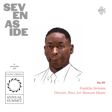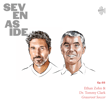Become a Creator today!Start creating today - Share your story with the world!
Start for free
00:00:00
00:00:01

Jon Allsop
The "Media Today" editor (Columbia Journalism Review) on the green shoots for journalism sustainability and irreconcilable necessity of government support, our “golden age” of media abundance, "trust" and the demand side of the equation, and the strategy and fortunes of his Plymouth Argyle in the clubs-as-content-studios era
Transcript
John Alsop's Media Analysis
00:00:11
Speaker
If the media industry has an internal monologue, it's arguably editor John Alsop in the twice-weekly column, Media Today, he for years has published for Columbia Journalism Review. What's staggering in sheer volume of output is surpassed by a depth and balance of analysis and introspection scarce in other precincts of the business world.
00:00:27
Speaker
What's more, a search for the term soccer on CJR's website reveals no shortage of Alsop bylines linking the game to the media state of affairs. A Man After Our Hearts. Here, a piece on the preening suite Zlatan Ibrahimovic landing Los Angeles before a social media influencer was common vernacular.
00:00:43
Speaker
And over here, a deep dive on Alsop's own Plymouth Argyle, the club's misadventures with manager Wayne Rooney, and the editorial and strategic dubiousness of the endless flood of sports documentaries.
Alsop's Diverse Writing Contributions
00:00:53
Speaker
Lately, Alsop has branched out, taking his talents to, among others, The New Yorker, where he writes on all manner of topic in the political, social, and cultural zeitgeists, including a gem of a piece in July on FIFA's idiosyncratic Club World Cup.
00:01:05
Speaker
As if he weren't occupied enough, he and May released his first book, a treatise endeavouring answers to the question, what is journalism for?
Future of Journalism Interview
00:01:13
Speaker
For this September issue Seven Aside, timed for UN n General Assembly, we're pleased to sit with Alsop, who breaks down his book and what he sees as green shoots for journalism sustainability, stresses the critical need for government support, particularly with local news, reflects on our golden age of media abundance, and the good editor he is pushes on some of my assertions about the demand side of the equation and consumer responsibility.
00:01:39
Speaker
You and I are connecting at a moment. not especially upbeat for journalism and the free press on the international scene. And and while we won't get into the nitty gritty of that, it it calls to mind, I think, some of what you bring up in your excellent pieces on Club World Cup and 2026 World Cup for CJR and The New Yorker, respectively. and And that is power at its rawest and most cynical. We see it in the sport. We certainly see it in media. um Which brings me to the book that you and Bristol University published this spring titled What is Journalism for?
The Purpose and Role of Journalism
00:02:09
Speaker
Something of a philosophical treatise on the topic. So ah starting there, how does your book make the case at this moment for for journalism? What new light were you hoping to shed? What what did you what did you learn in the process?
00:02:24
Speaker
Yeah. So I've been saying to people um who ask about the book that I just want to make sure they know front that I was not insane enough to write a book called What Is Journalism For? Like under my own steam.
00:02:35
Speaker
I was asked to do it by Bristol University Press. And it's it's part of a series um over there ah titled What Is It For? So they're asking that same question of like a whole range of social concepts institutions so i think there's like what is veganism for is one of the titles what are prisons for what are the olympics for i believe is is one that already is out there um obviously with ah with a sporting flavor um and so uh they kindly reached out and asked me if i would write the edition called what is journalism for and this was a few years ago and obviously we're in this kind of broader
00:03:10
Speaker
political moment that I think is, is you know, has has continued since then. But it was it was a different moment in in many respects. You know, it was a little hard to imagine that Trump would come back so convincingly, for example, back then.
00:03:21
Speaker
um And so it was a book that I wanted to write, um not sort of like of any one particular moment, or at least not sort of leaning into that, um but something that would, you know, still be relevant for readers to pick up in five, ten years, um and and they would be able to sort of recognise the content.
00:03:42
Speaker
At the same time, obviously, I didn't want it to be a work of kind of pure abstract philosophy. And inevitably, if you write a book about journalism as a journalist, it's going to contain stuff in it that is, you know, recent history or that it is going on right now. So I guess it was about trying to find a balance between between those things.
00:03:59
Speaker
like So yeah, i guess I guess I'd say my answer... doesn't just apply to this moment. I did try to sort of find a universal answer, even if some of the examples are contemporary. But basically I make the case that um journalism has three core functions or at least three sort of areas of function that it but operates in.
00:04:20
Speaker
um One of those is that it is perhaps the foremost tool a society has to judge what is true, and I deal with that in a chapter titled Judgment rather than like Truth or Reporting, just because I think that um the exercise of judgment, which to some extent is inherently subjective or at least can't be fully objective, is is really the kind of guiding thing that determines, you know, how journalists decide what stories they're going to write about in the first place, right? Before they even then grapple with what facts to accumulate in what order, how to check those facts, whose perspectives to include.
00:04:53
Speaker
that's That's sort of one thing. it's about, you know, sort of shaping how society receives and understands the truth about itself. The second one is criticism. And I don't just mean that in a kind of negative sense. It's this idea of constantly kind of critically analyzing and thinking about the world around us.
00:05:09
Speaker
And then the third idea is community. And I say that's sort of an idea rather than a function, because I do you think journalism ultimately usually does serve a community, be that a community of interest, like, you know, football fans, for example, sorry, soccer fans, I should say.
00:05:23
Speaker
um You're going to have to keep correcting me on that one throughout the pod, I think. um but but also you know uh ethnic communities religious communities that being said all of those communities i think in this hyper-globalized world we're in in particular have a stake in the same problems they're all sort of part of one interconnected whole and and you know problems do arise sometimes so quite acutely in certain societies when certain news organizations kind of draw barriers between different communities rather than um helping them sort of dialogue with each other. So it's a little bit of a nuanced idea, I hope, that goes beyond this sort of cliche that journalists must serve community. Yes, I think they must, or they at least they do, but it's it's but a bit more textured than that.
00:06:03
Speaker
um And yeah, then it sort of tries to situate those functions in you know relation to democracy, um which obviously is in decline ah you know all around the world as we speak.
00:06:16
Speaker
um And then it tries to sort of situate journalism in in relation to different functions within society. i think certainly in the US, there can be a tendency for journalists to think in kind of messianic terms that you know they're going to be the one who takes down a president or you know stops a local pollution, polluting local company from pouring toxic sludge into the local lake. And I think that's great when those things do happen. But I also think those things constitute ah what is usually kind of exceptional and broadly unrealistic approach
00:06:48
Speaker
um you know an expectation of what journalism can and can't do on its own. And I think it's sort of a call to say journalists need to focus on what they can do, which is reporting the truth and to the extent that they're in control of it, trying to get people to read, listen to, watch it, however they consume it, um rather than sort of wringing their hands because it feels like no one is is kind of acting on that ah political level. ah You know, there are other functions and institutions within society that the journalism needs to also do their jobs. and And it's not journalists jobs to make those people.
00:07:17
Speaker
um yeah we Ultimately, we can't force those people to do to do better. We can just sort of hold them to account um in the journalism that we do. So it's that's that's sort of the overarching argument.
00:07:28
Speaker
from the From the why to the to the how, from the philosophical to the practical, because as you say, it's it's not just a ah ah philosophical reflection, but it's it's clear that rebalancing for journalism
Sustainability Challenges in Journalism
00:07:40
Speaker
sustainability in a free market system calls for a top to bottom reimagining of the media ecosystem and economy on par with, say, the transition to clean energy.
00:07:50
Speaker
What are the things that you're seeing, new models, imperatives, innovations that give you hope for journalism's not just survival, but the ability to thrive? Yeah, so I think there are models that are out there that are demonstrating some potential. um Clearly, you know, a shift from relying on putting putting your content out for free, but having, you know, loads of adverts against it, that seems to be giving way to subscription models that are clearly working at least for some players, right? That's working for the New York Times very, very well. It's working for even individual journalists on Substack, some of whom are making, you know,
00:08:30
Speaker
huge amounts more money than they would have done by staying in a traditional newsroom. um Now, of course, there are downsides to that model. People who can't afford to pay get frozen out. And I think when you're talking about, you know, the sort of informational lifeblood that people need to live their lives in an informed manner, that that is tricky. But um at least in terms of the health of news organizations, that's that's, you know, a promising model for some.
00:08:51
Speaker
ah The nonprofit model, of course, it's not a panacea. um But there are excellent, particularly at local level, nonprofit newsrooms that have sort of picked up some of the slack left by the decline or even death of privately owned, often these days private equity controlled local papers that you know were in their pomp. 30, 40, 50 years ago, but since then sort seen their budgets and their staffs whittled. And I think there are examples of those all around the US s and and indeed in other countries as well.
00:09:21
Speaker
um think that the sort of reason to be less optimistic is that these solutions, as i sort of suggested, work for individual players. They don't necessarily scale for everyone, right? Like not every outlet can have a successful subscription model in a world where people who are affluent enough to pay for new subscriptions, I mean, they're not going to pay for subscriptions to everything.
00:09:40
Speaker
um You know, these nonprofit newsrooms, again, they're not immune from market forces. They are reliant on donors to give them money, which obviously correlates to conditions in the broader economy.
00:09:51
Speaker
um And often that they're sort of small. They they also um often don't pop up as, you know, often in places where.
00:10:02
Speaker
The need for information is arguably greatest right, you know, sort of rural areas or or areas that are not big cities that that often um have more of an ecosystem to support these kinds of organizations. So, i mean, one thing I argue in the book, and and this is sort of in that chapter that I mentioned about how journalism relates to the rest of society and other social institutions, it's that journalism really needs help from The government basically, I think, to survive. um And that is obviously a compromising and non-ideal position, given that journalism exists to be a check on those in power.
00:10:32
Speaker
um But, you know, it's just a fact, right? Like there is no world in which there is no relationship between government and and the press, even... you know, a world in which there is, or a society in which there is some hypothetical perfect ideal of press freedom, and the press is totally commercially um independent from government and thriving on those terms, that that still entails like an absence of regulation, which is still ultimately ah political choice.
00:10:55
Speaker
So um I think what we need to do is have more democratic movements, including in the US, let's say particularly in the US, um to to really fund the informational needs that people have and and to fund news. And that can sound like a pipe dream sometimes, and especially at a moment when ah you know you've just seen Trump and and the Republican-controlled Congress claw back funding for the Corporation for Public Broadcasting, which is now going to shut down.
00:11:23
Speaker
Seems like maybe the worst possible moment to be having this conversation. um But there are actually growing movements in states all around the country. And yeah, blue states more than red ones, but with a degree at least of bipartisan buy-in um for like state governments to...
00:11:40
Speaker
fund or in other ways support local outlets because politicians in those states have seen that the things they do, that, you know, the the things they rely on to communicate with their constituents, local newspapers are dying and that, you know, informational infrastructure is essential. So, you know, i actually think there are reasons to be both pessimistic, but also at the same time perversely hopeful, even in the US, you know, a country that has ah very kind of weak public media infrastructure compared to others.
00:12:07
Speaker
And then all around the rest of the world, you know, you still see thriving, relatively thriving public broadcasters, right? I mean, pretty much all of them are under constant financial political pressure. Thriving might not feel like the right word if you sort of work in one of them, but certainly compared to, you know, what's happened to NPR and PBS, you know, the the bbc is BBC is still sort of a news juggernaut funded by, um essentially funded by taxpayers for a particular mechanism. Yeah.
00:12:32
Speaker
you know i think I think the evidence is just overwhelming that we we are living through a time of total market failure to support them journalism, but I think there is still a real demand and even a need for journalism um that has to be met somehow. And I think that it's up to people to lobby for it and policymakers to act on it. And I think that you know below the headlines about, below the headlines suggest that that isn't happening. I think it actually is to to an extent that might surprise people who haven't been following it super closely. like Do the bigger players, given the uneven gains in the marketplace, ah the winners or those who aren't winners necessarily, do the bigger players owe anything to the smaller ones in terms of developing a sustainability model?
00:13:15
Speaker
That's a very interesting question. i don't know if like in any moral sense they owe things back. I mean, I guess you could make the case that the New York Times finds out about things that happen all around the country and indeed all around the world by reading much smaller and less powerful outlets on the ground and then sending their own reporters to do versions of the same story. I mean, the Times has been accused for a very long time of sort of picking up smaller outlets work and and not crediting them. but But I don't even necessarily mean that. Right. I mean, like that is just how journalists at big publications find out about things. so It's one you know one way they find out about things, among others.
00:13:49
Speaker
um So in that sense, you know, it would be in their interest to redistribute maybe a portion of what they're doing to local outlets. And actually, I think the New York Times does have at least a fellowship program where it where it works with um local news partners on investigation. So there is some of that already going on.
00:14:07
Speaker
At the same time, you know, the New York Times is doing well, but I don't obviously don't speak for them. I've never worked there or anything. And I don't um know anyone who is sort of in charge of running the company over there. they're doing well, but, you know, the history of media is littered with examples of companies that appear to be doing well. And then some sort of immensely disruptive technology happened, or there was a huge sort of society-wide or or economy-wide shock, um or even just sort of a a more gradual post process of reader abandonment and decay, um or even or poor management. you know there are all sorts of factors that mean that success doesn't necessarily last forever. So, um you know, the Times is doing well for now. I don't know if they would want to
00:14:42
Speaker
say, you know, we have completely cracked this in a durable way that's foolproof, let's, um you know, give loads of our money to other players rather than, rather than, you know, investing it in securing our own future even more.
00:14:53
Speaker
um So, so, you know, and that and that's, that's where I think that that really, it's the governments that have just vastly more resources that are directly responsive to democratic pressure. And and I think journalism is democratic, good, and therefore, it should really be more at that level that the responsibility lies.
00:15:08
Speaker
That being said, you know, it's not sort of an ideological or dogmatic point necessarily and and to the extent that private ah privately owned and run news organizations that run for profit are in existence, are sustainable and do good journalism, that's great. It's nothing against them.
00:15:24
Speaker
um It's just to say that that profit motive has demonstrably, especially at the local level in the US but again in other places around the world too, proven that it's not it's not providing that journalism at sufficient scale.
00:15:37
Speaker
That's where the problem lies. Sure, and and perhaps I reframe that question. um Is there an opportunity for the bigger players to help bolster the smaller ones? I think of the Washington Post's ad exchange initiative, Zeus, I believe it was called, Vox Media with Concert, and of course Google News Initiative as examples, how however imperfect, of marketplace-driven ideas and
Journalism's Evolution and Technological Impact
00:16:03
Speaker
solutions.
00:16:03
Speaker
But I'd also like to touch on the journalist as influencer phenomenon and and the the media model it espouses. Puck, in this sense, comes to mind. um Is that to you anathema to some of the principles espoused in your book?
00:16:19
Speaker
Yeah, just quickly to address the the point about the Washington Post and Google and e etc. I think that that's pretty much a good um encapsulation of of what I was talking about before the Washington Post was doing very well.
00:16:30
Speaker
And now is doing much less well, you know, it's been hemorrhaging readers and subscribers partially through their own very questionable strategic and editorial decision making. um But you know, that's not really a paper that and And I think reports of its death are somewhat exaggerated. There's still a lot of great journalists there doing great work, but it's not a paper that's in and a sort of leadership role necessarily to to be able to like go and say, we're going to be the ballast for loads of other organizations. They've got a lot to get in order in their own house.
00:16:57
Speaker
As for Google, you know I think that social media companies have proven to be extraordinarily unreliable partners for for newsrooms and and any largesse that they sort of happen to throw newsrooms away, they should really be treated as a kind of temporary bonus, not something to rely on.
00:17:12
Speaker
To come on to the influence question. Yeah. So I think um I was very keen for the book to not sort of hitch on to any kind of like faddish new trend or new sort of platform in particular. Like it would have been very easy to write ah what is journalism for book like purely through the prism of TikTok. But then.
00:17:32
Speaker
you know, and TikTok was banned in the US. Obviously that ban is not being enforced, which is kind of insane given that it was legislated and then approved by the Supreme Court. But, you know, there's a world in which that ban was enforced. And suddenly by the time the book comes out, US readers are not using TikTok or they're not, you know, their access to it has been sort choked off, at least in some meaningful way. And it becomes kind of irrelevant.
00:17:53
Speaker
um AI is obviously not a like individual platform. I think it would be wrong to dismiss it as a fad. Equally, I think that there are, there's a lot of hype that I don't necessarily see as warranted in the journalism space in particular right now. And I think it's very uncertain how AI is going to change the way journalism is delivered going forward. Um, even though some trends like, for example, um, you know, search answers becoming text-based, ah text-based kind of, you know, generated summaries as opposed to like a wall of blue links. i mean, that seems to be playing out with bad consequences for news outlets traffic already, but, um, but you know, it's, it's still, I think in quite an embryonic phase in terms of how it's going to,
00:18:29
Speaker
durably affect the news industry. so So I wanted to write a book that, you know, was you sometimes kind of acknowledged some of these things as examples or ah things that were going on. but there wasn't like super dependent on them. and And that could be read kind of, you know, as a sort of platform or technology agnostic, I guess. And and that's partly because, you know, it's a, it's a book and it has to last a long time, right. You know, it's, it's, it's something that I hope will still be relevant in five, 10, 20 years even.
00:18:54
Speaker
um But also because, you know, i think that if you look at the history of journalism, there has always been technological innovation. There have always been predictions that a certain new type of distribution model will totally upend everything. And sometimes it has, but,
00:19:05
Speaker
the actual sort of like philosophical principle of journalism has remained i think remarkably consistent over hundreds of years um and that and that's because people need information about the world right like people need reliable information about what is going on in the world um that's whether they hate journalism or love it whether they profess to hate journalism or love it whether they believe they consume journalism or they believe they avoid it right like Everyone needs facts about what's going on in the world and they need those facts to be true. It guides, um you know, how we respond to big social problems. It guides basic day-to-day economic decision-making, both at the levels of corporations and and individuals, right? Like that that is just a human need. I think what we're seeing at the moment is that need is still being met, but, you know, with less and less information about at certain levels, again, particularly in the local because of the market failure we discussed earlier.
00:19:54
Speaker
earlier so it's kind of a long wind up to say that like i don't really care how journalism is distributed necessarily i care about the sustainability of it i care about it being well funded and happening but like i don't see any problem with like an influencer model of journalism where individuals with big followings are um you know breaking news on tiktok or substack or puck which is you know really just a news organization with with people who work for it who are you know have established reputations from elsewhere but they essentially sort of built a magazine with a newsletter model um
00:20:31
Speaker
I don't see any inherent problem with it. um i have written before about this. I have a little bit of a queasiness with like a star system in journalism, just because i think that building up certain people as being... perfect uh you know allies the fact that journalism is is at its best ah you know often a team sport you know there are often unsung legions of editors fact checkers well increasingly there's not legions of these people because these jobs are disappearing at many publications but you know at its best you still have these people who who play a vital role um uh and also you know everyone is fallible right uh so so you know i don't love this idea of like a star system within newsrooms but like this idea of sort of individuals on social media
00:21:11
Speaker
um or individuals who write newsletter being trusted disseminators of information. As long as the information is good, I don't really mind. ah guess where the problem comes, and i sort of have a hard time with this idea that people sometimes espouse, which is like, you know, the the Joe Rogans of the world or like people who are on TikTok. I mean, that's not journalism. They're sort of killing journalism.
00:21:31
Speaker
it's It's not journalism in like a strict sense, um especially when it sort of veers into like conspiratorial territory. But like you know Joe Rogan reads the news, right? Like people on TikTok read the news. And often it's like journalism that has been done by someone else that is being like funneled into their conversations or their posts or their sort of you know standup videos or whatever. Otherwise they'd have nothing to talk about.
00:21:51
Speaker
So like this idea that journalism is dead is just false. And if it was, we'd all notice because again, there is this like real, real need for it. um What strikes me as problem is, you know, if if a local news organization that is barely keeping the lights on spends six months um investigating, you know, like a lead pollution scandal locally in the water supply.
00:22:13
Speaker
um They do this amazing work. It somehow gets published despite all the obstacles. And then someone on TikTok with like 700,000 followers just reads it out to their followers and they get you know, all the, all the glory from it or the attention from it. Now, obviously you could have a situation where that person then sort of guides people back to the original source and they get donations for all they could work or whatever. It's not like, it's not like a simple, um right ah you know, simple, as simple as saying these people are like stealing content and they certainly don't think they would always think they're doing that or intend to, but there's clearly, there's clearly a problem if like the resources that get put into something are then, know,
00:22:48
Speaker
essentially enabling this publicly available information to be sort of monetized by someone else and that that is that is a serious problem and i think that needs that needs addressing but it comes back to that conversation we had earlier on about market failure about money there are things that democratic states can do about that um i don't think any of it reflects like a diminishing demand for journalism in its simplest form as like knowing new facts about the world i think regardless of the technological landscape that is a thing people need and it's thing people want even if they claim not to Well, back to that, I think that segues very neatly into our the the demand side of this. So a political comedy writer and and substack defector, Jeff Marr, ah who used to write for ah Last Week Tonight with John Oliver, um we've had him on this program. He contends that the American electorate, I'm very much paraphrasing here,
00:23:34
Speaker
is increasingly divided, not along political lines, but between the informed and and the uninformed, which I tend to agree with. um You have to work pretty hard in this media environment with so much reliable information at our fingertips, as you point out, to to to be ignorant, um which yeah begs the question, what what responsibility does does the consumer, the the citizen bear in all of this? how how How do we correct for but a waning appetite, regardless of political persuasion, for reliable information much less the critical thinking that you talk about yeah look i think that's a reasonable conclusion and i guess i just find assertions like that increasingly i'm sure i've i've made them in the past but increasingly especially after writing this book i find those to be very kind of huge assertions that ah ah that are quite hard to pin down um and you know i don't think it's like
00:24:32
Speaker
this, this world, not, I'm not saying this is, um you know, what anyone that you've mentioned or, or anyone else like is specifically saying, but that there can be this kind of idea that bubbles up that like, you know, we lived in, or America was this like wonderful, fully informed society where everyone watched Walter Cronkite on the news and there was no conspiratorial thinking and everyone knew what was
Information Availability and Misinformation Challenges
00:24:50
Speaker
going on. And then the ghastly internet came along and algorithms made everyone enraged and it's all now really terrible. And everyone believes that, you know, vaccines will like turn you into a frog or something. And,
00:24:59
Speaker
Um, we've had this total epistemic collapse and we're going to hell. And I think it's really important to like separate out in that, like what is, what feels true about it and and what doesn't.
00:25:11
Speaker
Um, you know, I don't think it's the case that, um, people have always been like super well informed. I think in fact that actually we're living in a golden age for at least the availability of information.
00:25:21
Speaker
um And that that is a good thing. And that has made enormous numbers of people who maybe the media doesn't talk about when it talks about uninformed people ah actually very well informed, much more so than they would have been in the past.
00:25:33
Speaker
um Yes, you know, it's true that kind of Walter Cronkite style news shows and the New York Times have lost gatekeeping ability over the flow of information and to some extent that is bad because um you know those are professional journalistic enterprises ultimately and their job is to vet the reliability and accuracy of information in a professional way at the same time those you that process is not cannot be objective um it was done in the 60s and 70s certainly disproportionately by rich white men who have a certain outlook on the world um and the internet has totally democratized the ability to find out facts it has led to a profusion of blogs and social media commentators who often are saying and doing interesting things so you know that that that all
00:26:16
Speaker
is happening. And, you know, and I think that sometimes the internet can make the people who are ill-informed and those who are conspiracy theorists more visible um in a way that makes it seem like they weren't there before when actually they were there all along.
00:26:32
Speaker
Now, of course, the infrastructure of the internet gives those people more ability to talk to each other. The way that um social media platforms are set up often incentivizes those people to get enormous reach. um It drives people down rabbit holes of inflammatory content. We know that.
00:26:45
Speaker
That is a problem with the way social media is designed and regulated, I think. And I think, again, the democratic state has things it can do about that. And, um you know, I think we're increasingly seeing an appetite for states to do something about that, even if we've allowed these companies that control these platforms to become so huge that, um you know, the sort of reverse regulating them is going to be difficult.
00:27:03
Speaker
um So, and, you know, people who want one particular sort of bugbear of mine often is the way news avoidance is talked about. You know, we we often hear that people are avoiding the news in record numbers.
00:27:16
Speaker
And often, actually, if you look at the way sort of questions are asked about that survey questions or just sort of actual news consumption data, people are still getting news. They might be getting it from sources that are secondhand, for example, um ah you know, but, but, but often they are. and And I think it was one study and I think I cited in my book, although it's been a while since I last picked it up. So I, I may be a misremembering, but I think it's something, you know, well, put something to the effect of saying that actually people who are,
00:27:43
Speaker
claim to avoid the news the most are people who consume a totally healthy amount of news. They just see themselves as avoiding the news because at some point their consumption stops and they get too sad or anxious or depressed to carry on or or you know they feel like they should just be more informed.
00:27:55
Speaker
um I think there is a sense in which the internet has created again this like informational golden age, there's this extraordinary abundance of available news. right people are not People are not required to mainline that 24-7. People are allowed to have lives. They are allowed to like consume the news for half an hour a day and and that's it um and and i don't and you know Often ah people will draw sort of quite dire conclusions from people responding to survey questions like, do you sometimes selectively avoid the news?
00:28:22
Speaker
But, you know, if I asked you that question, I'm sure you would say yes. If you asked me that question, I would definitely say yes. And I'm a journalist. My job is to consume the news. But sometimes I want to take a week off or on Sundays I don't don't read the news. Right. Like it's it's a normal like it's a normal psychological thing. And so I think that you've got to separate out what is actually troubling about the sort of broader trends in our informational landscape and what is stuff that might appear to be troubling.
00:28:46
Speaker
but but isn't so much and definitely think there are problems with the way it's structured don't get me wrong and i don't think we have a sort of globally healthy informational culture at the moment at the same time i think some of the forces that are the reason for that have been good in other ways um and it's just sort of a reality that we have to live with and and work out collectively how to better regulate i would say um but yes to answer your initial question so i've kind of rambled through it uh people yeah of course i think people have a responsibility to be well informed I think anyone who aspires to be a good citizen should try and read up on the news. I don't think that translates into a requirement to spend a certain a lot of ah amount of time per day reading the news or to do or to consume it in a certain way.
00:29:23
Speaker
um i think it's I see the problem very much more as being on the supply side than the demand side, though, for all the reasons that we've but we've discussed about the market failure and everything else. Well, we are verging on UN n General Assembly and Climate Week, which of course is so much about the corporate narrative and and CSR and so forth. But it's it's also the the narrative, and this ties back to what you were talking about earlier with with surveys and and the the framing of of certain surveys. the the um shelf life of the narrative around the supposed decline of quote unquote trust in institutions and of course media tends to be high on that list as someone who embodies the media industry's internal monologue and and propensity for self-reflection how how does the the trust rhetoric sit with you
00:30:15
Speaker
Yeah, so I think I'm going to discuss this in very similar terms to how we've talked about other things, which is I think there's a real problem there.
Trust and Critique in Media
00:30:22
Speaker
But I think it's very hard to pinpoint. And actually, a lot of the discourse around it is quite tedious and does more harm than good, in my opinion. So...
00:30:30
Speaker
is there a deficit of trust in the news media, not just in the US, but globally? Yes, of course. I think we can all see that, right? um Politicians are mining that distrust for electoral benefit all over the world.
00:30:41
Speaker
um It seemingly is proving very effective. um There's way more like rhetorical bashing of the press than there used to be. Again, I don't particularly like the idea that this just sort of was something that Trump invented and then exported worldwide, but like there clearly has been an effect when the president of the you know arguably the most powerful country on earth um set such a poor example other autocrats feel they can do it as well and and i think that that is bubbling up from profound sense of alienation among many people um with you know elites in general but like with the media certainly as part of that elite um and
00:31:18
Speaker
That is a problem. and And, you know, to the extent that certain members of the electorate or politicians will turn around and say, well, you've just reported this story based on months and months of reporting, but actually I hate you and I think you're lying to me and you're fake news, so I don't believe what you say.
00:31:31
Speaker
That's a real thing. It's a problem, 100%. ah hundred percent ah Ditto, you know, declining trust in all sorts of other governmental institutions. That being said, I'd say a few things. um Number one, i think that while the media is a very big place,
00:31:47
Speaker
major kind of corporate media outlets have done a lot to earn distrust. Um, um, ah you know the iraq war episode i think is something that is discussed a lot but maybe not enough in the sense that i really think that that damaged the credibility of the industry as a whole in an enduring way i actually think that the fallout from those wars is like a super huge reason why trump got so popular and i don't think that's like an original take but i do think it sometimes gets underplayed in like the menu of takes about his rise i think it was like super super central to it um in a broader sense
00:32:20
Speaker
newsrooms often do not and have not looked like the communities they're supposed to represent or from which they spring, both at the local level and nationally. um You know, there is a degree to which they've become, many of them have become out of touch. And when you become out of touch, people trust you less.
00:32:33
Speaker
So I don't think that that, you know, the decline in trust is like totally unearned. At the same time, totally on the flip side of that. a lot of the decline in trust, even if there is like a seed of it being earned to some extent, is being driven by people like Donald Trump, who just will say black is white, and it's an attack. And so I find sometimes that conversations about media trust are like ciphers for what people really mean, particularly in the US, which is some version of like, Trump supporters specifically don't trust us, how can we sort of pander to them to get them back? And I think saying sort of a version of this play out at the Washington Post at the moment. Yeah.
00:33:07
Speaker
yeah you know, when they scrapped the editorial of Kamala Harris before the election at Jeff Bezos, his personal request, he he came out with this sort of self-justificatory op-ed that was like, reader trust is super important to us. And, you know, endorsing people in the editorial pages makes people trust us less. And that's bad.
00:33:22
Speaker
I mean, that's an argument you can make the timing of the decision right before the election looked like he was caving to Trump, though. It looked like he was scared of Trump becoming president again and and harming his business interests. And whether that's true or not, that led to more distrust in the Washington Post, like loads and loads of people canceled their subscriptions.
00:33:38
Speaker
And so I think to the extent that, yeah, you're saying that people don't trust us and therefore we need to like calibrate our content to sort of panders people who don't trust us when so much of it is rooted in like dishonest political attack. It's totally counterproductive and it's only going to piss off the people who did trust you.
00:33:53
Speaker
um i think in in the aftermath of any election, but particularly when a right winger wins, the people who didn't vote for that person and who broadly do trust the media or at least some media outlets kind of get completely ignored in like national discourse. Right. And so like, you know, Trump wins.
00:34:08
Speaker
Yeah. a majority for sure. And it was definitely a more decisive win than the first time he won. All of that is true. But the idea that like, Sometimes people talk about it as if he won a huge landslide. He didn't.
00:34:19
Speaker
um And so you know that that idea of trust sort of is defined along partisan lines is a bit suspect to me in terms of the reality that it's actually representing. um And then there's the sort of trust surveys where people are asked, do you trust the media?
00:34:35
Speaker
And again, i do think it's a very real thing. I also think if you ask me or like someone who maybe spends less time thinking about like what the words the media actually means, even do you trust the media? They will say no. And often that's not actually reflecting something that is bad. um You know, if you ask ah a Democrat, for example, do you trust the media?
00:34:54
Speaker
And the first thing that associates in their head with the media is like Breitbart or like pro-Trump outlets. And they say, no, I don't trust that. Well, I would say they have a very good reason to not trust it. Um, equally, you know, even on the sort of more mainstream side of things, we' not trying to draw a false equivalence between like the New York Times and Breitbart, they're obviously totally different ah in terms of how trustworthy they are, but they get things wrong, they frame things in questionable ways.
00:35:17
Speaker
Um, you know, again, part of my book is about how the media has a responsibility to sort of critically analyze everything in society. And I think a reciprocal obligation um among people or at least something that people are entitled to do is critically analyze where they get information from. and in fact, I think that's absolutely essential in a democracy. And if that means that you don't just blanket trust things that you read, even if they're coming from usually trustworthy interlocutors, that's a good thing, I think.
00:35:40
Speaker
um And so, you know, there is a middle ground here between being complacent about the idea that, you know, trust is declining. It certainly is for all the reasons I outlined at the beginning of this answer. But I think there's also, you know, a danger that you can interpret that loss of trust in the most like apocalyptic way and then use that to sort of conclude that you have to like run after a sort of perceived reader who has lost trust in you in ways that then can compromise your trustworthiness to others and and i think that that can become a kind of dog eating its own tail thing ah which i think is which i think is unhelpful and you know spent a lot of time thinking about this in the media context i'm guessing this is also true of declining trust in other institutions right partially earned
00:36:21
Speaker
to a large extent, also not earned and and, you know, sort of downstream of political attack. And often actually the metrics we're using under underpinning it all and the and the questions we're answering don't necessarily capture the complexity of people's views or like how they should see these things, I guess is so, so, so, you know, it's complicated, right? I think it's really complicated, but I think just this sort of blanket rhetoric or or sort of discourse about trust and institutions can sometimes miss some of those nuances. Yeah.
00:36:45
Speaker
Yeah. And, and, and it can be, it can be counterproductive and and it's overly simplistic. And I agree. I'm like Edelman has, has been riding on that for for a long time. um Lastly, at Plymouth Argyle, you you and writer Aaron Timms are refreshingly candid on the issue of sports and and sporting institutions dissolving into the the nebulousness of quote unquote content.
Sports and Media Content Growth
00:37:08
Speaker
um As your pilgrims face this new season, the next chapter and and this inflection point, including, if I'm not mistaken, looking at new investment, um have you any concerns about the club falling into some of the growth traps that that others have?
00:37:24
Speaker
So on the content side of things, I wrote earlier this year about a documentary that we had agreed to participate in um about Wayne Rooney, who was our head coach.
00:37:36
Speaker
uh well i say at the time he wasn't by the time that i wrote this piece he was our head coach at the beginning of the 24 25 season he did very poorly overall lasted a few months but um while times were relatively good in the sort of earlier part of his tenure there was a proposal for a company uh that has made documentaries by him and his family before to do a sort of fly on the wall uh project about about the club um and his tenure there and basically it it never happened because I think they did a couple of, they filmed like a couple of training sessions, our form sort of nosedive. They were asked to take a break and, and then I came back and Rudy was, was fired.
00:38:10
Speaker
Uh, and we ended up getting relegated from, from the championship or the, or the second division in, in the UK or in England, I should say. So, um, Yeah, that that was sort of a a weird episode. And the piece that i wrote was essentially about this sort of trend of not just soccer clubs, but, you know, other sporting franchises getting in documentary crews to do these sort of fly on the wall films. And I think that often those can become very samey, very dull, um you know, lacking in insight, sort of manicured ah to make the the participants look good.
00:38:45
Speaker
That's not always the case. I don't think these documentaries are like a bad thing in and of themselves, right? I mean, Sunderland Till I Die. i don't know if any of your listeners have i' watched that, but that is a show following the fortunes of Sunderland Football Club, who are now back in the Premier League, and and that's great for them. ah Got an enormously passionate fan base. But um yeah, they were filmed, I think, coming down from the Premier League last time and entering the championship.
00:39:06
Speaker
And the expectation was very clearly, we're going to go straight back up and this this film is going to be, you know, a sort of testament to our like Phoenix from the ashes moment. And they ended up getting relegated again and had just a totally, totally shambolic season.
00:39:20
Speaker
um And then their sort of attempt to bounce back at the first attempt into the championship, which is um you know the context for the second season of the show. ah is is a bit of a disaster as well. So that is great because I think that the filmmakers have sort of an unusual degree of autonomy um for these sorts of projects, if I understand that correctly.
00:39:39
Speaker
And also just because ah the source material was very funny in the end. You know, you know if everyone likes a sort of good pratfall story, especially when it's not your club that's being depicted. So, um ah you know, I don't think these these documentaries are about the game and off themselves, but to the extent they've become this sort of repetitive genre that offers no insight.
00:39:55
Speaker
I think they're not great. I think if I was a professional soccer player, which I'm obviously not, I'm not sure how I would love having the the sort of glare of the cameras on me 100% of the time, ah even you know in in otherwise closed settings. I don't know if that would be good for my performance or not.
00:40:11
Speaker
So, um you know, it's it can be a bit of a mixed bag. i think we with Argyll, I didn't have any sort of like particular problem ethically with the documentary. You know, maybe it was a bit of an eye roll.
00:40:25
Speaker
moment ah but you know the the club are key to sort of boost their appeal they've explicitly denied many times that that they that they um you know hired Rooney as like a PR coup obviously the documentary posed the impression that maybe that's actually what they did do I actually happen to believe them when they say they did it for footballing reasons even though I think those those reasons were strange given his previous track record as a head coach um I think it was actually maybe a ah case of us trying to be a bit too clever by half and and sort of see something in him that ah you know, ultimately wasn't there or we weren't able to bring out.
00:40:58
Speaker
um But, you know, there definitely was a side effect of like, he was super famous and it it put us on the map in a sporting sense. You know, people who otherwise wouldn't have been any interested at all in the club got interested. um And yeah, it could be a double A store again.
00:41:11
Speaker
um You know, there's little in this conversation that is like inherently good or inherently bad and quite a lot sort of murkiness. And like, it depends in in the middle, right? Just, I guess, like the rest of the conversation we've had.
00:41:21
Speaker
Yeah. But ah yeah, I think we're... so So we're talking a couple of weeks into the new season. Again, we got relegated last last year. So we're now in League One or the third tier. And I think there was an expectation that the club is now in a much better position than it was when we were last at this level a couple of years ago. Back then, we were not expected to get promoted to the championship at all. It wasn't really commensurate with our budget, but we just had an amazing season, massively overperformed.
00:41:47
Speaker
I think there's a sense now that having had those years of the championship, you come down a lot richer. You come down you know with a bigger budget, with more expectation, with more of you know ability to draw all players. And actually, and you know, so there was a sense that maybe that kind of growth journey we've been on is is able to continue, even though we've gone down a lead.
00:42:03
Speaker
And so far at time of recording, hasn't really worked out that way. You know, we had all of our players who were good taken, other players who were less good left as well. We've had build a whole squad from scratch. think that comments that were made by the ownership led fans to believe rightly or wrongly that that we were to have a super competitive budget at this level so far we haven't seen ton of evidence of that i don't want to say we've seen no evidence there have been some signings for money but we've we've we've spent way less in transfer fees than than the outgoing the squad is looking very small we've already got a lot of injuries we lost the first two games of the season I'm hoping by the time your listeners listen to this will have gone on an amazing winning run and everything will be more positive but at the moment there's this you know
00:42:42
Speaker
a bit of negative energy around the place. So yeah, I don't really see that as related to the the content strategy. Exactly. In fact, I think the club have got better about the content offer that there is a professional organization put out. We now have like a TV breakfast show before games, which I've watched a few times and is quite good. You know, there's, there's like a lot of content going up on the sort of clubs in house TV all the time, you know, the sort of quality of the presentation of that has has really improved in the last few years.
00:43:06
Speaker
And I think those are actual, like, you know, there's good things about growing in the club. Um, But I think obviously those things are all sort of irrelevant if you are terrible on the pitch or or regressing on the pitch, because A, that's the whole point of being a soccer club.
00:43:20
Speaker
But B, also, you know, if you if you regress too much, then obviously the the amount of money you're able to make goes way down. to look over your shoulder financially, potentially, and then those other offers either come under threat or they just look sort of obsolete. So yeah, we're at a kind of inflection point right now and it's it's too early to say how that's going to look and and i hope you know I'm more hopeful than certain other supporters that we will turn it around but and continue on a positive trajectory. We we generally have good owners um by the standards of English football, which has its fair share of um charlatans in charge of of running football clubs.
00:43:53
Speaker
ah You know, we we as we as a club nearly went bust in the, you know, the sort of turn of the 2000s and 2010s. um After having some unscrupulous owners, we were, you know, probably very, very close to just going out of business entirely.
00:44:05
Speaker
We didn't, we were saved. And now we're running in quite sustainability conscious way. But, you know, even good owners make mistakes and and can make errors of judgment, like hiring Wayne Rooney as head coach. So, ah you know, it's been an interesting ride.
00:44:19
Speaker
I'm sure I'll continue to hear about it.
00:44:25
Speaker
Thanks to our guest, John Alsop, and you, our listener, signing off for Kit Magazine and Studio Santiago. I'm Evan Howell.


















